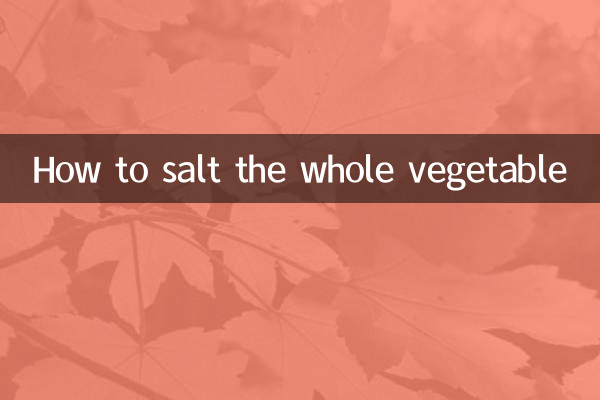How to salt the whole vegetable
Recently, the hot discussions across the Internet have focused on life skills, healthy diet and the revival of traditional culture. Among them, the topic of how to salt the whole vegetable has sparked widespread discussion. This article will combine popular topics in the past 10 days to introduce the salting method of the whole vegetable in detail, and attach relevant data and analysis.
1. Overview of popular topics on the entire network in the past 10 days

| Ranking | Hot Topics | Discussion volume (10,000) | Main Platforms |
|---|---|---|---|
| 1 | New trends in healthy diet | 125.6 | Weibo, TikTok |
| 2 | Traditional pickling techniques | 98.3 | Xiaohongshu, B station |
| 3 | Household food storage tips | 76.8 | Zhihu, WeChat |
| 4 | How to preserve vegetables | 65.2 | TikTok, Kuaishou |
2. Detailed explanation of the salting method of the whole vegetable
Whole vegetable salting is a traditional method of food preservation, which can not only extend the shelf life of vegetables, but also add a unique flavor. The following are the specific operation steps:
1.Material selection and treatment: Choose fresh and non-damaged whole vegetables (such as cabbage, mustard greens, etc.), remove the outer layer of old leaves, clean them and drain them after washing.
2.Salt preparation:
| Material | Dosage ratio | Remark |
|---|---|---|
| Coarse salt | 5%-10% of the weight of vegetables | Adjust according to taste |
| Clean water | Appropriate amount | For soaking |
3.Salting process: Apply coarse salt evenly to the whole vegetable, place it in a container layer by layer, and press on heavy objects to ensure that the vegetables are completely immersed in salt water. Let stand at room temperature for 3-5 days, and pay attention to the fermentation during this period.
4.Save and eat: After the salting is completed, transfer the vegetables to a clean container and store in a refrigerated manner. Before eating, you need to soak it in clean water to desalt it, and then cook according to your personal preference.
3. Nutritional value and precautions for salted vegetables
Salted vegetables not only retain part of the nutrients of the vegetables, but also produce probiotics through fermentation, which helps intestinal health. However, excessive intake of salted foods may be detrimental to health and it is recommended to eat them in moderation.
| Nutritional ingredients | Content (per 100g) | effect |
|---|---|---|
| Dietary fiber | 2.5g | Promote digestion |
| Vitamin C | 15mg | Antioxidant |
| Lactobacillus | 100 million CFU | Regulate the intestinal tract |
4. Netizens' hot opinions
1.Combination of tradition and modernity: Many netizens believe that salting techniques are the embodiment of traditional culture and should be improved in combination with modern technology, such as controlling salt and adding probiotics.
2.Health concerns: Some netizens have suggested that the high salt content of salted foods may cause problems such as hypertension, and it is recommended to eat them with caution.
3.DIY fun: Homemade salted vegetables have become a new trend, and netizens have shared many creative recipes, such as adding chili, garlic cloves and other seasonings.
5. Summary
As an ancient method of preservation of food, whole vegetable salting still has practical value and cultural significance in today's society. Through scientific methods and moderate consumption, we can enjoy traditional delicacies and take into account both health needs. I hope this article can provide you with useful information. Welcome to try making your own salted vegetables!

check the details

check the details